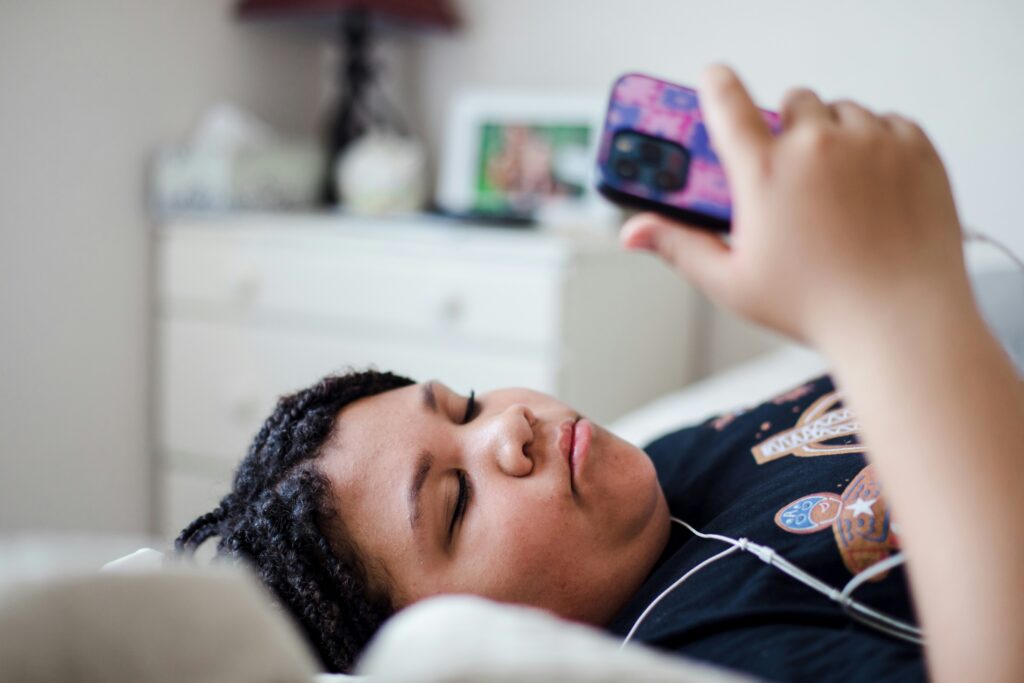How mindful parenting, nature-based strategies, and therapy can support your teen’s relationship with technology
In today’s hyper-connected world, screen time has become a central part of teenage life—used for school, socialization, entertainment, and even emotional regulation. While technology has undeniable benefits, there is a growing concern among parents, educators, and therapists about teen screen addiction and its impact on mental health and overall development.
This blog explores the psychological and emotional effects of excessive screen time on teens, holistic therapy approaches to address screen dependency, and how therapy can support families in developing sustainable screen-time boundaries.
Understanding Teen Screen Addiction
The term teen screen addiction refers to the compulsive or excessive use of digital devices—such as smartphones, gaming consoles, tablets, or computers—that interferes with a young person’s ability to function, form relationships, and regulate emotions. While it’s not formally recognized as a clinical diagnosis in the DSM-5, its symptoms closely resemble other behavioral addictions and can have serious psychological consequences.
Teens struggling with screen addiction may experience:
- Heightened anxiety and depressive symptoms
- Emotional dysregulation and irritability
- Poor sleep and difficulty waking up
- Academic decline or social withdrawal
- Difficulty being present without a screen
And now, new data confirms the urgency behind this concern. According to a 2024 report from the World Health Organization, rates of problematic social media use among adolescents have risen from 7% in 2018 to 11% in 2022. Additionally, 12% of adolescents are at risk of problematic gaming, with 22% reporting gaming for four or more hours on the days they play. Girls are more likely to report problematic social media use (13%) while boys are more likely to struggle with excessive gaming (16%).
These behaviors are not just habits—they’re becoming deeply entrenched coping mechanisms. Teens are using screens to escape anxiety, loneliness, and social pressure. The WHO report highlights that problematic screen use is linked to lower life satisfaction, increased substance use, and poor sleep, all of which can impact a teen’s emotional development and long-term well-being.
In an environment where nearly 1 in 3 teens is playing digital games daily, and over a third report constant online contact with friends, the line between healthy digital engagement and dependency is becoming increasingly blurred.
The Emotional Toll of Excessive Screen Time
Excessive screen use doesn’t just impact focus and sleep—it can also affect a teen’s emotional development and self-worth. Social media, in particular, can:
- Promote unrealistic standards and comparisons
- Increase exposure to cyberbullying
- Fuel perfectionism and self-criticism
- Diminish time spent in real-world connection
Parents often find themselves frustrated or helpless, unsure of how to address these patterns without causing conflict. That’s where a holistic approach can help—by addressing the root causes and building healthier habits from the inside out.
Holistic Therapy for Teens: A Whole-Person Approach
Unlike rigid screen-time rules that often lead to resistance, holistic therapy for teens supports change by focusing on mind-body awareness, emotional regulation, and values-based living. This approach recognizes that screen overuse is often a symptom—not the core problem.
Holistic therapy explores:
- Why a teen might be drawn to screens (boredom, anxiety, loneliness)
- How screens function as coping mechanisms
- What internal resources can be strengthened to reduce dependency
Below are some effective holistic strategies for managing teen screen addiction:
Mindfulness Practices for Teens
Mindfulness helps teens become aware of their impulses and emotional patterns without judgment. Practicing mindfulness cultivates self-regulation, focus, and present-moment awareness—all of which can reduce compulsive screen use.
Simple strategies include:
- Guided meditations focused on breath or body awareness
- Daily screen-free mindfulness journaling
- Using mindfulness bells or apps (ironically, tech used to support tech moderation)
- Practicing a “pause” before picking up the phone
Therapists often integrate mindfulness exercises in sessions, giving teens tools they can practice in daily life.
Nature Therapy and Outdoor Engagement
One of the most powerful antidotes to digital overstimulation is reconnection with the natural world. Nature therapy—also known as ecotherapy or green therapy—can lower cortisol levels, improve mood, and offer a grounded sense of perspective.
Ways to incorporate nature into a digital detox include:
- Daily walks or hikes without phones
- Gardening or hands-on outdoor activities
- Nature-based group outings or therapy sessions
- Mindful observation exercises (watching clouds, sketching nature, etc.)
Creating positive, screen-free experiences outdoors can shift a teen’s dopamine-seeking behavior from devices to real-life pleasure.
Structured Routines and Intentional Tech Use
Many teens reach for screens out of boredom or lack of structure. A predictable routine—with built-in tech-free time—helps establish rhythm, accountability, and balance.
Screen-time management strategies might include:
- Setting designated screen-free hours (mornings, before bed)
- Using physical clocks and books instead of phones
- Co-creating a tech contract with input from both parents and teens
- Implementing a “digital sunset” an hour before bed
The goal is not punishment, but intention—helping teens use technology mindfully rather than compulsively.
How Therapy Supports Teens and Parents
Family dynamics often play a key role in teen screen addiction. Conflict over screen time can escalate quickly, leading to power struggles, avoidance, and feelings of failure on both sides. Therapy creates space for reflection, communication, and healing.
Individual Therapy for Teens
A therapist can help your teen:
- Explore the emotional reasons behind their screen habits
- Build coping strategies for anxiety, loneliness, or academic pressure
- Develop a stronger sense of identity outside of social media
- Reconnect with their values, creativity, and real-life goals
Family Therapy and Mindful Parenting Support
Therapy also empowers parents with tools for mindful parenting—approaching tech boundaries with empathy, clarity, and consistency. Parents learn how to:
- Set boundaries without shaming
- Understand their child’s tech usage as a form of communication
- Model healthy screen use in the home
- Rebuild trust and connection
Rather than creating a battleground over devices, therapy helps families work as a team to support long-term change.
The Power of Digital Detox (Even in Small Doses)
A digital detox doesn’t have to mean giving up all devices forever. Instead, it’s about creating conscious pauses from technology to help reset the nervous system, improve sleep, and re-engage with life offline.
Even short-term detox periods can:
- Improve mood and emotional resilience
- Reignite hobbies or passions outside of screens
- Enhance focus and academic performance
- Reduce tension and disconnection in family relationships
Holistic therapists often support teens in creating personalized detox plans—small, realistic shifts that build momentum over time.

How to Encourage Your Teen to Try a Digital Detox
The idea of a digital detox might sound extreme to a teen who’s constantly connected, but with the right approach, it can feel like an empowering reset instead of a punishment.
Here’s how to support your teen in embracing a digital detox with curiosity, not resistance:
1. Start with a Conversation, Not a Command
Instead of leading with rules, lead with empathy. Ask open-ended questions like:
- “How do you feel after being on your phone for a few hours?”
- “Have you ever wished you had more time for other things?”
- “Would you be willing to try a short break and see how it feels?”
Framing it as an experiment rather than a restriction gives your teen a sense of agency.
2. Share the “Why” Behind the Detox
Help your teen understand the emotional and mental benefits of stepping away from screens. Share science-backed info about how breaks from social media and gaming can:
- Improve mood and energy levels
- Strengthen in-person relationships
- Reduce anxiety and improve sleep
Make it about wellness, not control.
3. Start Small and Build Gradually
A successful digital detox doesn’t mean going cold turkey. Instead, try:
- Tech-free mornings for the first hour after waking up
- A 24-hour “phone sabbath” once a week
- No screens at meals or in bedrooms
- A weekend challenge to replace scrolling with real-world experiences
Even 30-minute screen breaks throughout the day can create momentum.
4. Create a Detox Plan Together
Involve your teen in creating their own plan. Let them decide:
- When and where they’ll take breaks
- What they’ll do instead of being on a screen (reading, art, movement, etc.)
- How they’ll track their progress or reflect on the experience
This gives them ownership and increases follow-through.
5. Replace, Don’t Just Remove
The most effective digital detoxes don’t just eliminate screens—they replace them with fulfilling, screen-free experiences. Encourage your teen to:
- Spend time in nature
- Revisit creative hobbies they’ve neglected
- Connect with friends offline
- Try yoga, breathwork, or journaling
If the alternative feels good, the detox won’t feel like deprivation.
6. Model the Behavior You Want to See
Teens are more likely to take digital detoxing seriously if they see you participating too. Set boundaries for your own screen use and make detoxing a family practice. You might be surprised by how restorative it is for everyone.
Final Thoughts: You’re Not Alone
If you’re a parent feeling overwhelmed by your teen’s screen use, you’re not alone—and there is support. The goal isn’t to eliminate technology from their lives, but to help them form a healthier, more balanced relationship with it.
At Awakened Path Counseling, we offer holistic therapy for teens and families that addresses the full picture—mind, body, emotion, and connection. Through mindfulness-based practices, nature-focused strategies, and compassionate support, we help teens reclaim presence and purpose in a digital world.

Ready to Get Support?
Whether you’re just starting to notice changes in your teen’s screen behavior or you’ve been in ongoing battles over tech, now is the time to take action. A small shift today can lead to big change tomorrow.
Reach out to schedule a consultation with a therapist who understands screen-time struggles and the path to balance. Let’s help your teen reconnect—with themselves, their family, and the world beyond the screen.


